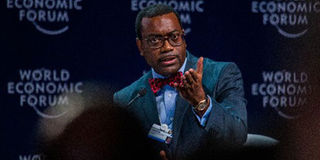New report applauds African growth rate

Akinwumi Ayodeji Adesina, President of the African Development Bank (AfDB), and Co-Chair of the World Economic Forum on Africa. AfDB notes that continent needs to hit 7 per cent mark every year to cut poverty levels. PHOTO | AFP
What you need to know:
- Africa remains the second-fastest growing economic region after East Asia, says a report.
- The continent’s average growth is projected at 3.7 per cent in 2016 and will pick up to 4.5 per cent in 2017.
- Last year, net financial flows to the continent were estimated at $208 billion, 1.8 per cent lower than in 2014.
LUSAKA
Africa remains the second-fastest growing economic region after East Asia, says a report. It, however, notes there is need for a higher expansion rate, if the continent is to make a meaningful dent in poverty levels.
The report by the African Development Bank (AfDB) said the continent’s average growth is projected at 3.7 per cent in 2016 and will pick up to 4.5 per cent in 2017, provided the world economy strengthens and commodity prices gradually recover.
Titled African Economic Outlook 2016, the survey says Africa’s economic performance held firm in 2015 amid global headwinds and regional shocks.
Last year, it said, net financial flows to the continent were estimated at $208 billion, 1.8 per cent lower than in 2014, due to a contraction in investment.
The report was released on Monday during opening of the lender’s annual meeting in Lusaka, Zambia. The forum brings together several delegates from around the world.
MAKE REAL IMPACT
While launching it, AfDB acting director development research department, Mr Abebe Shimeles, said to make any real impact at reducing poverty, Africa needs to grow at a rate of 7 per cent per year.
And during a panel discussion on sustainable cities and structural transformation in Africa, UNDP assistant administrator and regional director, Mr Abdoulaye Mar Dieye, said Africa had made some gains in human development, especially in education.
Mr Dieye said one of the major challenges facing cities on the continent was governance as local administration was neglected by national governments.
UN Habitat executive director Aisa Kirabo Kacyira said African cities need to rethink their land administration, which she said was the major bottleneck to sustainable growth.
She said currently, distribution of land in most African cities is not equitable.
Organisation for Economic Cooperation and Development director, Mr Mario Pezzini, said Africa is urbanising fast, but there is slow infrastructural transformation to support their sustainable existence.




